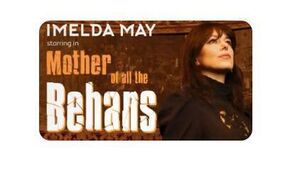Imelda May's towering performance tells the mother of all Behan's stories

Imeda May put in a towering performance
There’s more than a touch of ‘Je ne regrette rien’ from Kathleen Behan (Imelda May) that leaves me with many regrets, and Kathleen Behan had much to regret.
The narrative of her chaotic life is well told in this immense performance by the dazzling Imelda May, who holds the house in the palm of her hand throughout. Songs, anecdotes, asides, characters and passion fill the stage in the 90-minute scattered narrative of a largely dysfunctional life.
Kathleen was born into wealth. Her parents came from landowners and her father owned a business on Lower Dorset Street, with a grocery, pub, and a row of houses. All squandered. Following his death in 1897, Behan and her sisters were placed in the Goldenbridge orphanage, Inchicore by their mother, aged nine. When she left, aged sixteen, she rejoined her family in a one-room tenement flat on Gloucester Street.
They were all mad republicans. Her brother Peadar Kearney wrote the national anthem. Kathleen was an active member of Cumann na mBan, and served as a courier for Pearse and Connolly in the GPO in 1916. She married Jack Furlong, who fought in Jacob’s barracks during the rising. Sean was born six months after Behan was widowed when Jack Furlong died in the Spanish flu epidemic of 1918. She then lived with her mother-in-law, who was also a republican and was arrested for running an IRA safe house. She worked for a short time, for small money, for Maud Gonne as housekeeper, where she met Yeats and Nora Barnacle.
Her chaotic life deepened in 1922 when she married Stephen Behan, house painter, trade unionist, fellow republican and miserable drunkard. The couple had four sons and one daughter: Brendan (b. 1923), Seamus (b. 1925), Brian (b. 1926), Dominic (b. 1928), and Carmel (b. 1932). Brendan was born while his father was imprisoned during the Irish Civil War, leaving her destitute. Stephen's mother – ironically known locally as ‘Lady Behan’ – owned three slum tenements and so they lived rent-free in a one-room basement flat at 14 Russell Street.
Lady Behan kept young Brendan in her bed and gave him drink from the age of six. When she died in 1936, the Behans moved to a newly built council house in Crumlin, living at 70 Kildare Road, where services – schools, doctors, post office etc. – were non-existent.
Despite their circumstances, the house attracted republicans, communists, socialists, trade unionists and hangers-on, and was known locally as ‘The Kremlin’ and a madhouse by Stephen. Radical politics had a strong effect on Brendan and Dominic. During The Emergency of 1939 to 1945 she fought against local shopkeepers who ignored price controls, and was labelled as ‘red’ for her anti-Franco and pro-Stalin sympathies.
Kathleen reveled in her Brendan’s fame. She would travel to London to see his plays and appeared on tv programs where her strident in-yer-face views attracted followers.
Peter Sheridan’s script is adapted from Brian Behan’s biography, ‘Mother of all the Behans’, with additional material from Rosaleen Lenihan and works well to create the chaotic nature of all of Kathleen’s families. It never really deals with the regrets that decisions and lifestyle choices make on impressionable young lives. All actions have consequences.
Not all of the consequences can be laid at the foot of the troubled times she lived in. Family histories of drunkenness that became systemic, wasted opportunities and squandered earnings, indulgence of Brendan’s worst traits and a whinging husband tolerated when a well-directed boot might have been more appropriate along with a cold sober look at where her activisim had left her and her family. Half her family spent time behind bars.
Piaf’s ‘Je ne regretted rien’ anthem stands as a commitment to living life unapologetically and embracing every moment with courage. BUT it also demands an honest appraisal of a life that could have been better spent.
Imelda May’s performance is stunning. She brings the real-living-breathing Kathleen before us in a towering performance. I love Imelda May’s voice. Her singing brings passion, drama and understanding to the social context that set tunes such as ‘Miss Houligan’s Cake…Laughing Boy…Molly Malone… … Johnny I Hardly Knew Ye…Auld Triangle’ along with a gloriously sentimental ‘Dublin Saunter’ that sees the audience joining in.
Well worth the ticket.






